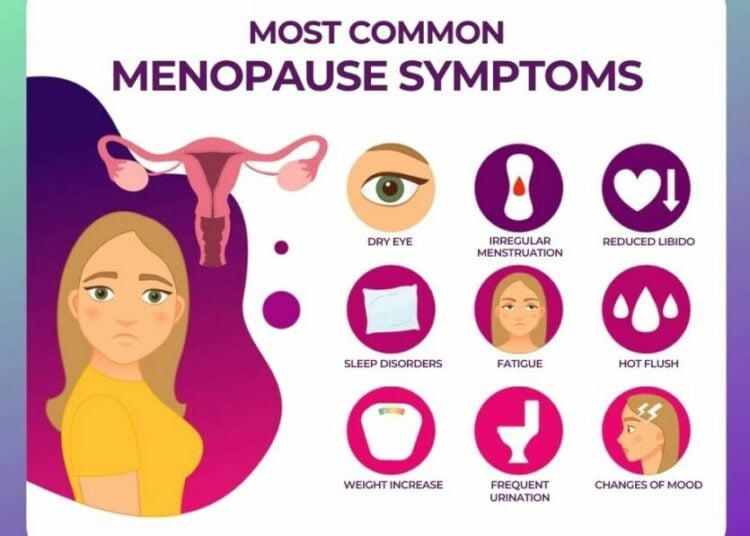In many Nigerian homes, menopause remains a hushed topic, a natural transition often wrapped in silence, myth, and unease. Yet for millions of women in their 40s and 50s, it is far more than a biological milestone; it is a profound physical and emotional turning point that deserves to be seen, understood, and discussed openly.
Research published in the African Journal of Reproductive Health (2020) shows that the average Nigerian woman reaches menopause at about 48 years old. But what happens in the years before and after the mood shifts, hot flashes, body changes, and identity adjustments is still largely misunderstood or dismissed. This quiet neglect not only isolates women but also robs them of the support, healthcare, and social understanding they deserve.
Menopause, medically defined as the end of a woman’s menstrual cycle for 12 consecutive months, is not a disease but a natural phase. Still, it comes with symptoms that can affect nearly every part of life, from mood swings and hot flashes to sleep disruptions, memory lapses, and joint pain. The World Health Organisation (WHO, 2023) estimates that up to 75 per cent of women experience vasomotor symptoms such as hot flashes and night sweats, yet only a fraction in low- and middle-income countries seek medical help.
The hormonal changes, especially declining estrogen and progesterone, affect multiple organs. Reduced estrogen can lead to vaginal dryness, bone loss, and cardiovascular risk. Science shows menopause is also a time of profound recalibration, a shift not just in hormones but in identity, body image, and emotional health. A 2021 Lancet Global Health study on sub-Saharan Africa found that post-menopausal women are twice as likely to develop hypertension and heart disease compared to their pre-menopausal peers. Meanwhile, bone density loss accelerates, making conditions like osteoporosis a growing public health concern.
The psychological dimension is just as crucial. A study in the Nigerian Journal of Clinical Practice (2019) linked menopause to increased reports of anxiety, depression, and insomnia. Without proper counseling or community support, these issues can spiral, affecting work, relationships, and overall well-being. And yet, mental health during menopause remains an afterthought in most clinics and family conversations.
It doesn’t have to be this way. Around the world, menopause is becoming part of mainstream conversation, from workplace policies in the UK that recognize menopausal discomfort as a factor in productivity, to public health campaigns in South Africa advocating for hormonal education. Nigeria can learn from this shift. We need to normalise menopause as a health phase that deserves medical attention, not silence or stigma.”
Diet and lifestyle adjustments can also make a real difference. Nutritionists recommend diets rich in calcium, omega-3 fatty acids, and plant-based estrogens found in foods like soybeans, groundnuts, and flaxseed. Regular exercise, particularly weight-bearing activities like walking and dancing, helps maintain bone and cardiovascular health. The Harvard Health Review (2022) reports that even 30 minutes of daily activity can reduce hot flashes and improve sleep quality.
For many women, herbal and alternative remedies remain a first stop, from local preparations like “dongoyaro” (neem) to black cohosh and moringa. While some may offer relief, experts caution that unregulated herbal use without medical guidance can be harmful. The National Agency for Food and Drug Administration and Control (NAFDAC) advises consultation with qualified health professionals before combining herbs with prescribed treatments.
Equally important is emotional support. Talking openly, whether in women’s groups, religious gatherings, or clinics, can change how society perceives this life stage. Family members, especially spouses, play a vital role in understanding mood changes and providing empathy. As one Abuja-based woman in her early 50s shared in a BBC Africa (2023) interview, “What helped me most wasn’t medicine, it was my husband learning that my anger wasn’t personal, it was hormonal.”
Menopause should no longer be treated as an end, but a new beginning, a phase of power, wisdom, and renewal. Women who navigate it with knowledge and support can live healthier, longer, and more confident lives. And as Nigeria continues to push for gender-inclusive health systems, it’s time our conversations include the women who are quietly carrying the weight of this transition.
Menopause isn’t a pause in life, it’s a reminder that women’s health must evolve beyond reproduction to full-spectrum well-being. The silence must end because when women talk about menopause loudly, they don’t just reclaim their bodies, they inspire a generation to listen, learn, and live better. Ultimately, menopause isn’t just a physical transition, it’s also an emotional and mental one. Prioritising mental health during this phase is essential. Simple steps like talking to a trusted friend, seeking therapy, practising mindfulness, or joining support groups can help women find balance amid the hormonal and emotional shifts. When body and mind are cared for together, menopause becomes less of a storm and more of a passage, one that women can navigate with grace, strength, and renewed self-awareness.





